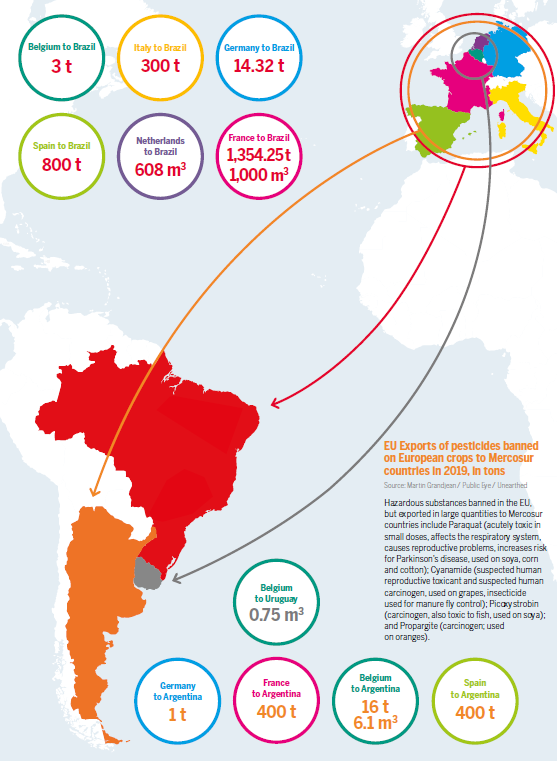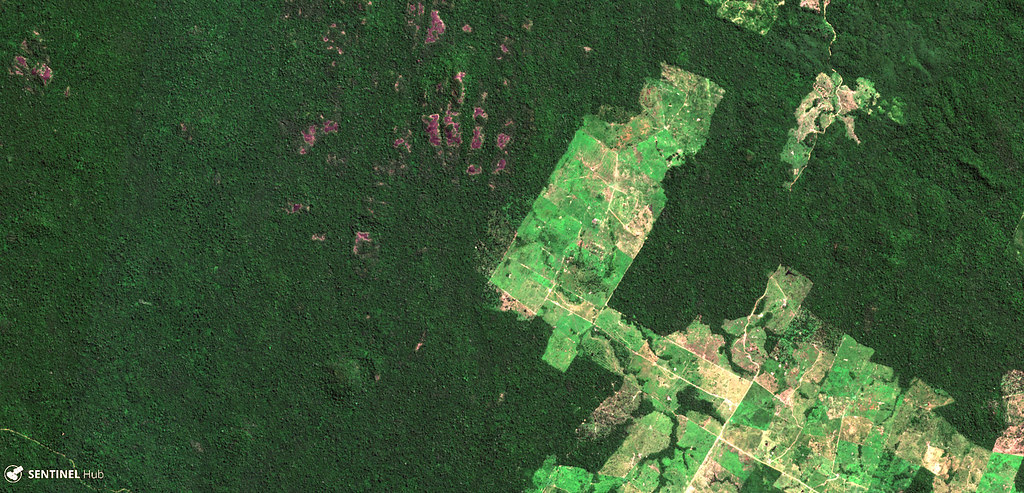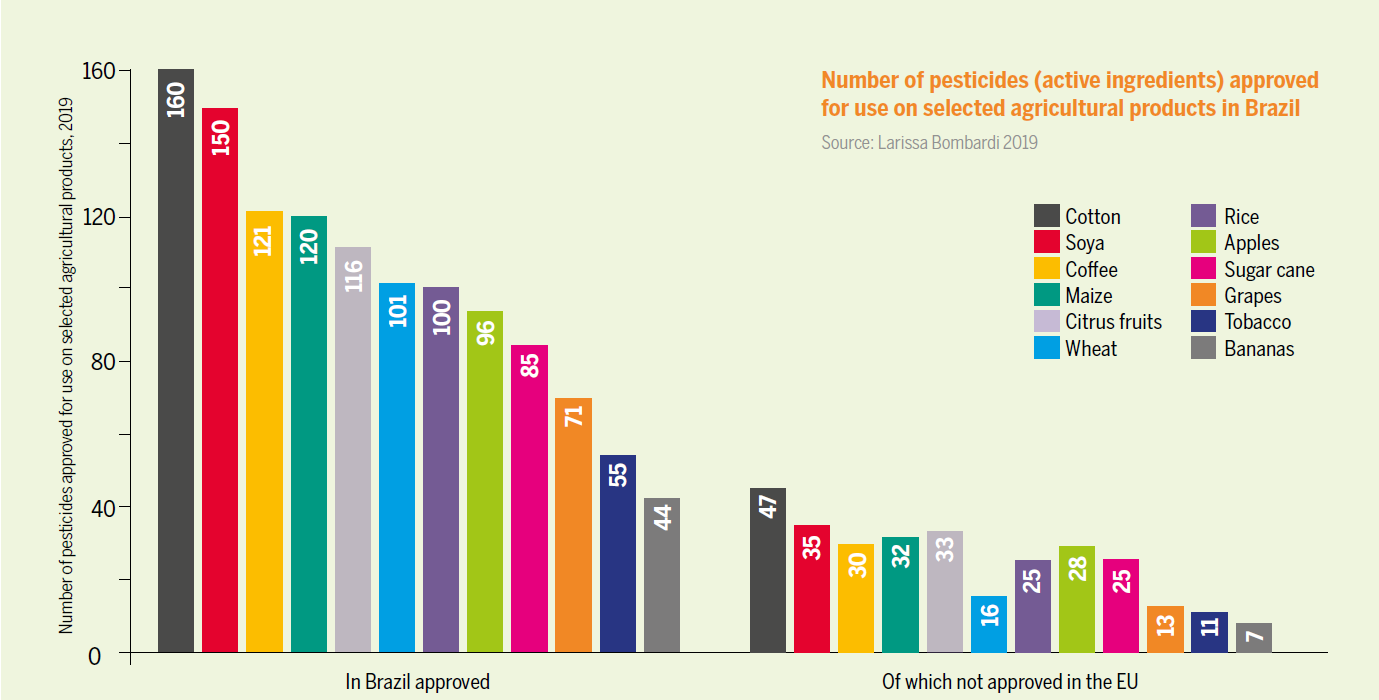The EU-Mercosur agreement : increasing pesticide use and GMOs, and undermining healthy food production and standards
IATP | 7 December 2020
The EU-Mercosur agreement : increasing pesticide use and GMOs, and undermining healthy food production and standards
by Sharon Anglin Treat
Download the PDF of the factsheet.
At the same time that the European Union is promising next-generation Farm to Fork policies and stricter pesticide regulations domestically, its support of the EU-Mercosur Free Trade Agreement (FTA) continues with policies that exploit the more permissive environmental and health policies of its trading partners. This double standard could further expose vulnerable populations and the environment to toxic chemicals and undermine the movement toward more sustainable agriculture in both the EU and the Mercosur countries. Based on available information, if ratified, the EU-Mercosur agreement would :
- Increase exports of dangerous pesticides from the EU to Mercosur countries
- Risk an increase in pesticide-linked human rights abuses
- Pressure regulators to speed up approvals of genetically modified, pesticide-dependent crops and expand their cultivation
- Risk economic harm to the organic and agroecological farming sector in Mercosur countries, while undermining next-generation food, environmental and public health policy in both the EU and Mercosur
EXPORTING DANGEROUS CHEMICALS
Trade in chemicals between the EU and Mercosur is currently worth €6,3bn annually. The EU-Mercosur FTA would reduce or eliminate over 90% of existing tariffs on chemicals, some of which are as high as 18%. The European chemicals industry strongly supports the ratification of the agreement, believing that significantly reduced tariffs will allow for “steady growth” in chemical exports to Mercosur countries. The European Commission’s Sustainability Impact Assessment (SIA) agrees, projecting a 47.6% increase in exports from the EU to the Mercosur in the chemicals, rubber, and plastics sector, even under the most conservative economic scenario (Table 8 at 34), with increases of 60.2% in an “ambitious” scenario (Table 10 at 36).1 At the same time, tariffs on pesticide-reliant crops grown in the Mercosur will also be reduced, raising the likelihood of increased pesticide use as the cultivation of these crops expands to meet increased demand. For example, tariffs on sugar cane used for ethanol production will be reduced to zero, and tariffs on ethanol itself will be reduced significantly.
As the EU has tightened its domestic pesticide restrictions, European chemical companies have taken full advantage of laws which allow the export of EU-banned chemicals to countries with more permissive standards. By cutting the cost of chemicals imported to Mercosur, the agreement incentivises the European chemical industry to continue this lucrative trade. According to a 2019 report by the former president of the Brazilian Association for Agrarian Reform, 44% of the substances registered in Brazil have been banned in the EU. Recent data show that 71 of the 113 BASF products approved in Brazil are highly toxic pesticides and 57 of these are not approved for use in the EU. Of the 123 Bayer products approved in Brazil, 78 are highly toxic pesticides and 36 not approved in the EU. Within the Mercosur, Brazil has a thriving chemical sector, the eighth largest in the world representing ten percent of the domestic economy. Zeroing out tariffs on chemical ingredients used in the manufacture of pesticides could also increase the production of high-hazard pesticides within Brazil.
Overall, EU member countries approved the export of 10,945 tons of pesticides containing substances banned for use on European crops to Argentina, Brazil, Paraguay and Uruguay in 2018, and 13,667 tons in 2019.2

“These loopholes are a political concession to industry, allowing their chemical manufacturers to profit from inevitably poisoned workers and communities abroad, all the while importing cheaper products through global supply chains and fueling unsustainable consumption and production patterns. It is long-overdue that states stop this exploitation.” Baskut Tuncak, then-United Nations Special Rapporteur on human rights and toxics, in letter signed by 36 UN human rights experts3
The practice of exporting EU-banned pesticides was called out as a human rights abuse by 36 United Nations rapporteurs and human rights officials in July 2020. In response to public pressure, including a letter from 70 NGOs and another signed by members of the European Parliament, the European Commission’s new Chemicals Strategy for Sustainability states the EU will “lead by example, and, in line with international commitments, ensure that hazardous chemicals banned in the European Union are not produced for export, including by amending relevant legislation if and as needed”. The European pesticide industry is already lobbying against implementing this proposed strategy, however. CropLife International, the powerful association of agrochemical companies, immediately objected to ending exports of EU-banned pesticides, saying “one size does not fit all.” The European Chemical Industry Council called for “detailed and rigorous impact assessments” on the proposal — an effective delaying tactic.
PESTICIDE POISONINGS AND HUMAN RIGHTS ABUSES
Brazil is the largest annual buyer in the world of Highly Hazardous Pesticides, those containing active ingredients with extremely acute toxicity and having chronic negative impacts on human health and the environment. In 2019 alone, the Jair Bolsonaro administration approved 474 new pesticides for use — the highest number in 14 years. Argentina is also a heavy pesticide user, including using 240,000 tons of the herbicide glyphosate in 2018, mostly for soya production. Studies link significant increases in cancer, spontaneous abortions and congenital birth defects in Argentina’s agricultural communities to glyphosate contamination. The UN Special Rapporteur on the right to food has raised concerns that the overdependence on pesticides in Argentinian agriculture is undermining food security and worker health and safety.
In Brazil, Professor Larissa Mies Bombardi of the University of Sao Paulo estimates that about 17,000 babies from birth to 12 months experienced acute pesticide poisoning between 2007 and 2014 – even though official data reported 343 poisonings. A 2020 UN human rights report stated “The tremendous use of pesticides is resulting in grave impacts on human rights in Brazil… Victims rightly allege deaths, health problems, as well as cruel, inhuman and degrading treatment resulting from pesticide exposure. Environmental degradation, including water contamination and biodiversity loss including of bees are grave effects.”4 In a landmark case that is illustrative of the routine agricultural practices there, the UN Human Rights Council found human rights violations in Paraguay, where peasants were repeatedly doused with toxic pesticides resulting in death, illness and contaminated land and water.
“Chronic exposure to pesticides is also widespread among children in Latin America. Pathways of chronic exposure include drift from sprayed fields, persistence in sprayed homes, and water or food contamination. Latin American children are occupationally exposed to pesticides because they represent a substantial part of the agricultural workforce and begin work at a young age.”5 Dr. Amalia LaBorde, Faculty of Medicine, University of the Republic of Uruguay.
The EU-Mercosur FTA will expand both the cultivation of crops dependent on pesticide use and the trade in pesticide products, and risks contributing to future human rights violations. The European Commission’s sustainability assessment fails to adequately address these impacts. On the one hand, the SIA documents the intensification of pesticide use across all Mercosur countries over the past two decades, including the use of unauthorised pesticides, while Europe has been decreasing pesticide use (Figure 23 at 83). The SIA also acknowledges the lax environmental standards and enforcement in the Mercosur countries, citing a 2016 Environmental Performance Index that ranks Mercosur countries well below European countries, with Argentina ranked 43rd worldwide, followed by Brazil at 46th, Uruguay at 65th and Paraguay at 82nd globally (Figure 15 at 71). The SIA notes negative impacts on indigenous peoples, reporting that Mapuche communities in Argentina have been “subject to major health issues including impacts from increased use of agrochemicals in the Gran Chaco region as well as soybean monoculture production which led to polluting the local air, soil and water.” Further, the SIA’s economic model predicts “increased output in some agricultural sectors in Mercosur countries” and recognizes that agricultural expansion “threatens indigenous health with the increase of pesticide use in the intensification of agriculture” (at 166). Nonetheless, the SIA ignores its own findings, and “does not anticipate an increase in the use and contamination of water or an intensification of the use of pesticides” resulting from the agreement, on the basis that the expansion of agricultural production will be “small” (at 166).
HARMING AGROECOLOGICAL PRODUCTION IN MERCOSUR COUNTRIES
Brazil is second only to the U.S. in the acreage planted with genetically engineered crops (51 million hectares), which include soya, corn, cotton and sugarcane. Argentina also cultivates transgenic soya, corn and cotton (23 million hectares) and is the third largest producer of biotech crops by area, farming 12 percent of the world’s total biotech crop acreage. Apart from Uruguay, all Mercosur countries are among the top 6 countries by the areas of cultivation of genetically modified crops 2018.
All of the estimated 18 million hectares of soybeans planted for the 2018/2019 season in Argentina are glyphosate tolerant (Roundup Ready) soybeans. Today, 60 percent of the world’s soya biodiesel, and more than 40 percent of global soybean oil and soya meal production, originates in Argentina. With the EU phasing out palm oil-derived biodiesel, the region is poised to expand its soya production and sugar cane to meet the demand of European consumers.
Expanding the cultivation of these crops could cause economic harm to the growing organic and agroecological sector in Mercosur countries. Contamination from genetic and pesticide drift is common and threatens traditional farming livelihoods. As a result of both direct GMO contamination and excessive glyphosate residues, Germany went from purchasing 90% of Uruguay’s honey exports in 2008 to purchasing only 15% of exported Uruguayan honey in 2017. Twenty-eight percent of Argentinian honey already contains genetically modified pollen from soya cultivation interfering with export and sale of this product. Argentina has the highest area of organically farmed land in South America with more than 4 million hectares of land under organic production. Uruguay has approximately 500 organic farms operating in the country, with organic production making up 5.1% of the country’s arable land. In Paraguay, while the land area farmed organically is tiny, 90% of the approximately 3,490 organic farms are operated by small farmers. Brazil’s organic food, cosmetic and textile markets are also expanding, generating about US$872 million in 2017. There has been a significant increase in registered producers of organic food over the past several years, increasing to 17,075 in 2017 from 6,700 in 2013. Seventy percent of these are small family farmers.
PRESSURING REGULATORS TO APPROVE MORE GMO CROPS, MORE QUICKLY
The agricultural biotechnology dialogue provisions of the EU-Mercosur agreement are aimed at speeding up approvals of GMOs and allowing low level presence on food and crops – in other words, allowing more genetic contamination of imports. Article 4 of the Chapter on Dialogues seeks to address “asynchronous authorisations of genetically modified organisms in order to minimize possible impact on trade” and “low level presence of GMOs not authorized by the importing Party, but authorized by the exporting Party.” This provision encourages regulators in both the EU and the Mercosur countries to adopt the least protective standard. If the exporting country allows higher levels of contamination, then the importing country will be encouraged to do so as well.
Compared to several of the Mercosur countries, the EU has a very slow and deliberate process for approving GMOs.6 The EU currently allows the unintended presence of GMOs in food and feed at the “technically unavoidable level of 0.9% or below” which is a recent shift from its prior zero tolerance policy. Argentina was the second country in the world to approve GMO soya and recently became the first to approve GMO wheat. Paraguay is also moving down this deregulatory path, adopting “simplification procedures” allowing for authorization of GMOs already approved by Brazil, Argentina and other countries. The dialogues chapter, which omits the precautionary principle and relies on behind-the-scenes consultations easily influenced by corporate lobbyists, could pressure the EU to relax its GMO approval process. Given their dependence on GMO crops and prior complaints about the EU’s GMO policies to the World Trade Organization, it is reasonable to expect Argentina and Brazil to use these provisions to advance a deregulatory agenda.
THREATENING AMBITIOUS FARM TO FORK PESTICIDE GOALS
The EU-Mercosur agreement is inconsistent with the EU’s recently announced Farm-to-Fork Strategy, which aims to dramatically reduce pesticide use and completely ban any residue on food of pesticides not registered for use in the EU. Pesticide corporations and trade partners have been pressuring the EU to allow banned substances in imported crops, and the Mercosur FTA will add to that pressure given the prevalence of banned pesticides in the region. The proposed residue targets are already vulnerable to political considerations and corporate lobbying. The policy has been questioned on grounds of food security by EU Agriculture Commissioner Janusz Wojciechowski, and the agriculture and chemical lobby have succeeded in their efforts to remove key provisions aligning the Common Agriculture Policy with these pesticide policy reforms.
1 LSE Consulting. “Sustainability Impact Assessment in Support of the Association Agreement Negotiations between the European Union and Mercosur.” July 2020. https://www.lse.ac.uk/business-and-consultancy/consulting/consulting-reports/sia-in-support-of-the-association-agreement-negotiations-between-the-eu-and-mercosur (last accessed 24 Nov 2020).
2 Laurent Gaberell and Géraldine Viret. “Banned in Europe : How the EU exports pesticides too dangerous for use in Europe.” Public Eye. September 2020. https://www.publiceye.ch/en/topics/pesticides/banned-in-europe (last accessed 27 October 2020) See spreadsheet.
3 Baskut Tuncak. News release. 9 July 2020. https://www.linkedin.com/posts/baskut_states-must-stop-exporting-toxics-to-poorer-activity-6695376195745300480-1D8i (last accessed 27 Oct 2020).
4 United Nations Human Rights Office of the High Commissioner. “Visit to Brazil, Report of the Special Rapporteur on the implications for human rights of the environmentally sound management and disposal of hazardous substances and wastes.” Advance Unedited Version. 17 September 2020. accessed from UN website : https://www.ohchr.org/EN/Issues/Environment/ToxicWastes/Pages/Visits.aspx News release : https://www.ohchr.org/EN/NewsEvents/Pages/DisplayNews.aspx?NewsID=25434&LangID=E. See also Human Rights Council Report on Brazil and pesticides, July 2018 :
https://www.hrw.org/report/2018/07/20/you-dont-want-breathe-poison-anymore/failing-response-pesticide-drift-brazils, updated November 2019 : https://www.hrw.org/news/2019/11/06/brazilians-poisoned-pesticides-sprayed-near-homes-and-schools
5 Amalia LaBorde et al. “Children’s Health in Latin America : The Influence of Environmental Exposures. Environmental Health Perspectives. Volume 123, number 3. (March 2015) https://ehp.niehs.nih.gov/doi/pdf/10.1289/ehp.1408292 (internal citations in quote omitted).
6 Library of Congress website (undated), Restrictions on Genetically Modified Organisms : European Union,https://www.loc.gov/law/help/restrictions-on-gmos/eu.php, last accessed 8 November 2020.
To download a PDF of the factsheet, please click here.
For original formatting (hyperlinks, notes), view the article on the original page







